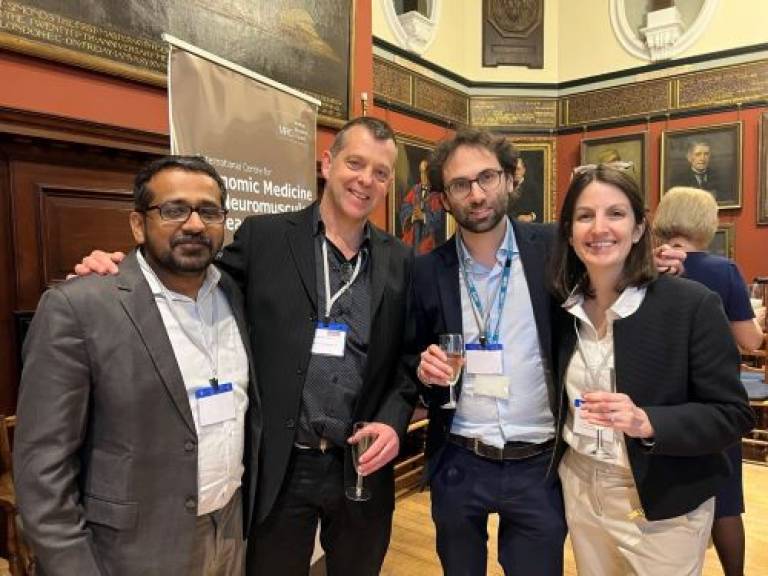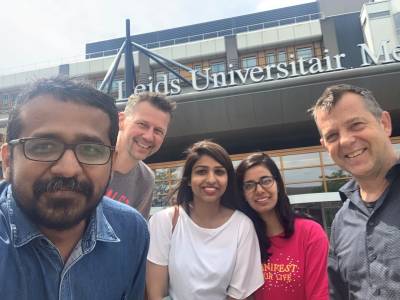ICGNMD Publishes First Indian FSHD Cohort Analysis
16 April 2024

ICGNMD colleagues meet in London in 2023 to discuss their FSHD research. L-R: Vishnu VY, Richard Lemmers, Enrico Bugiardini, Stephanie Efthymiou
ICGNMD is pleased to publish the first study of FSHD genetics in India today: https://www.nature.com/articles/s41431-024-01577-z
Facioscapulohumeral Dystrophy (FSHD) is a progressive genetic muscle disorder typically affecting muscles of the face, shoulder blades, and upper arms. It is the third most common form of hereditary myopathy. Although the genetics of FSHD are known to vary regionally, patients in India have never been studied to understand if the disease has specific genetic features in India, or Southern Asia more widely. This is important to do at a time when new therapies are being explored: India has the world’s largest population and is expected to have the highest number of affected individuals.
The ICGNMD AIIMS (Delhi) team, led by Vishnu VY and Padma Srivastava, recruited a very large cohort of suspected FSHD patients from across India, for careful clinical assessment and sample collection. Subsets of samples were sent Silvere van der Maarel’s team at LUMC in the Netherlands, where Richard Lemmers and colleagues undertook Southern Blot analysis to test for FSHD1 and 2, or to UCL Queen Square Institute of Neurology in the UK, for optical genome mapping by Enrico Bugiardini, Stephanie Efthymiou and colleagues.

The AIIMS ICGNMD team visiting Leiden to learn FSHD testing methods and implement them at AIIMS. L-R: Vishnu VY, Patrick van der Vliet, Rinkle Mishra, Alisha Reyaz and Richard Lemmers
During the study, a team from AIIMS also visited LUMC to learn testing protocols, to establish at AIIMS for further testing in-country.
The study found an overlapping, but distinct spectrum of FSHD genetics in Indian participants, compared to published cohorts of predominantly European ancestry. People of Indian ancestry are more likely to be unaffected carriers of FSHD in some genetic scenarios where people of European ancestry are almost always affected by FSHD. This is important when diagnosing a patient, as other types of dystrophy may need to be tested for too. It is also important for clinicians evaluating relatives of affected patients, to predict if they will also go on to develop FSHD. The study also found that, when FSHD is present, patients in India show the same severity of disease as other populations, highlighting the challenges patients and their families face day-to-day.
Vishnu VY (AIIMS) said “I am immensely proud to present this first cohort study from India, and anticipate further work to expand understanding of this debilitating disease across India, and wider Southern Asia. We hope future therapy trials will recognise India as a critical site to include.”
Richard Lemmers (LUMC) said “Leiden has a long history of exploring the global picture of FSHD genetics and we were delighted to engage with AIIMS to improve understanding of the disease in Southern Asia, and to grow testing capacity in-country.”
Enrico Bugiardini (UCL) said “I hope clinicians around the world will note our study’s findings. Here in the UK, we have a very diverse patient population and it is important to understand how ancestry can impact diagnosis and prognosis. We hope this will be a starting point for larger-scale studies to understand population-specific variation in FSHD.”
Conor Rickford (UCL Joint Head of Global Engagement) noted “UCL and AIIMS have worked hard to establish strong research connections, it’s rewarding to see that delivering important insights for the global FSHD patient community and underpinning wider collaborations.”
This work was supported by an MRC strategic award to establish an International Centre for Genomic Medicine in Neuromuscular Diseases (ICGNMD) MR/S005021/1, an award from Friends of FSH Research, a UCL:AIIMS collaborative research grant and ICMR award “Identification of the Genetic architecture of Facioscapulohumeral muscular dystrophy in India: 5/4-5/3/34/Neuro/2022-NCD-I”.
 Close
Close

